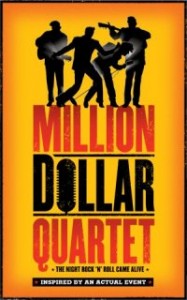 By Scott T. Allison and George R. Goethals
By Scott T. Allison and George R. Goethals
Over the past several years, the musical Million Dollar Quartet has been playing in major cities around the United States. It’s a fabulous show, featuring singer/actor/musicians portraying four 1950s rock’n roll heroes from Sun Records in Memphis Tennessee. The four are Johnny Cash, Jerry Lee Lewis, Carl Perkins and Elvis Presley.
The play’s performances are sensational. But the leading man is not one of the musicians, rather the actor playing the role of Sam Phillips, founder and owner of Sun Records. We have mentioned Sam Phillips before. His Sun Records studio on 706 Union Avenue is now a lovingly preserved national landmark in Memphis. Artists such as Bono and Ringo Starr still go there, either to record or just to see and touch the microphone used by the great singers of the golden “rockabilly” age of The Fifties.
The facts of the Million Dollar Quartet are fascinating in themselves. The play takes some liberty with actual events, making the story even more compelling than it was in actuality. But our need to make our heroes even more heroic than they really were easily accounts for those embellishments. In the theatre version, Sam Phillips is dealing with Johnny Cash leaving to sign with another record company, Carl Perkins is trying to find another hit after his early defining single smash, Blue Suede Shoes, and Jerry Lee Lewis is emerging as perhaps the most musically talented of all them all.  Phillips is the glue that holds them together. That part does fit the historical record. For that Phillips is a genuine hero to rockers of all ages.
Phillips is the glue that holds them together. That part does fit the historical record. For that Phillips is a genuine hero to rockers of all ages.
As best we can figure out, and supposedly authoritative versions conflict, here’s what happened. It was a Tuesday afternoon, December 4, 1956. Elvis was at his peak. That year he had had five number one singles and two top albums, his first movie, Love Me Tender, was a monstrous success, and his appearances on the Ed Sullivan Show drew 83% of the television audience. In contrast, after Blue Suede Shoes Perkins career hadn’t gone anywhere. He just didn’t have the charisma that blessed Elvis. Jerry Lee Lewis was only a studio piano player brought in to round out Perkins’ combo.
Johnny Cash had recorded I Walk the Line and Folsom Prison Blues with Phillips at Sun. But he was about to leave for another label. In this context, Elvis and his current girlfriend dropped by the studio. It was likely a relief to him to return to a familiar, nurturing place where he could just be himself. As the famous “quartet” and others in the studio chatted, Elvis sat at a piano and started playing and singing. The others joined in. Someone in the studio had the good sense to turn on the tape recorder.
What is so interesting are the songs they all knew and could work on together. At first, they are almost entirely gospel songs, reflecting their common Southern heritage. Later, they started doing more traditional rock’n roll. Elvis takes the lead on most numbers, and the others harmonize. They are clearly just having fun. Many historians of the era feel that by the end of 1956, Elvis’ best days were behind him. He was being homogenized into a bland, antiseptic round of recordings and films.
The Million Dollar Quartet was one of the last instances where Elvis was recorded in a setting where he was simply relaxing with his friends and his music, not trying to impress anyone. Still, the recordings, which were rediscovered many years later, impress us all.
Below is a clip of the Million Dollar Quartet singing Farther Along on that historic day in December of 1956.
“Someone in the studio had the good sense to turn on the tape recorder.” There’s one of the all-time great understatements. 😀
Million-Dollar Quartet sounds like a great play. I hope I get a chance to see it. This is classic, near-mythological Americana. Not only did these guys reshape pop culture, but they helped to shape the second half of the 20th Century and therefore everything that follows that. The iconic 50s, with all those tail-finned cars, drive ins, endless highways, jukeboxes, poodle skirts, leather jackets, noble rebels and grass-roots rock-n-roll, has become as much a part of American folklore as the Old West. Cool, baby. 8)
These are my heroes in my book. They created an era is the least to say of them and made the music industry boom. Heroes indeed.